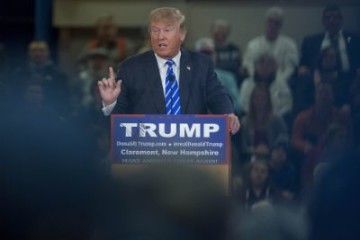Matt Levine’s Money Stuff: Bank Gloom and Trade Advice

©2016 Bloomberg View
O19FWE6JTSEP
(Bloomberg View) —
Banks
Goldman Sachs announced earnings today, just barely squeezing some of its $5.1 billion mortgage settlement into the fourth quarter; earnings were down year-over-year because of that charge. Here is the press release.
There is a lot of gloom at the banks. “Once Wall Street’s most lucrative business, fixed-income trading revenue declined for the third straight year in 2015,” and “banks are increasingly matching buyers and sellers of riskier debt and using less of their own money to facilitate client trades.” (Though, in a perhaps somewhat contrarian move, “Goldman has identified loans and bond underwriting as key sources of additional profit,” and “has been opening its checkbook to corporate clients wider than ever before” in an effort to win financing business.) “Banks of all sizes are marking down the value of loans and setting aside reserves to absorb additional losses as oil producers struggle to pay their debts,” and some oil companies have gone bankrupt with assets worth far less than their loans. And wealth management, that non-capital-intensive source of recurring revenue that was supposed to be a safe and reliable profit center for the banks, “can be a fair-weather business, too.” There’s not much left. Profitability seems likely to come mostly from cost-cutting; one analyst says, grimly, that “we’d have to have a pretty significant turnaround to avoid having cost cutting not be a major theme this year.”
Hedge funds
A lot of hedge funds had a rough year in 2015, but David Einhorn’s year was so bad that a small child could have done a better job of running a hedge fund, and that small child was not shy about letting him know it: There are lots of simple theories about what went wrong and what we can or should do about it. Everyone wants to help. Even one of David’s children suggested, “Dad, why don’t you just short your longs and long your shorts?” If only it were that easy…
Einhorn’s Greenlight Capital was down 20.2 percent in 2015, was “short the top two performing stocks in the S&P 500,” “long two of the ten worst performing stocks in the S&P 500,” and “had four shorts taken over,” so you can see the kid’s point. If you had invested in Einhorn Junior Capital Management at the beginning of 2015, you’d have significantly outperformed Greenlight. Of course, in the previous 18+ years, Greenlight significantly outperformed EJCM. And here is the critical part: You couldn’t have invested in EJCM at the beginning of 2015, because EJCM didn’t exist then. (Never mind in 1996.) The first glimmerings of EJCM’s investment thesis came to Einhorn’s daughter only after seeing her father’s results. It’s easy to say “why don’t you just short your longs and long your shorts” then! Out of the mouths of babes comes mostly sarcastic hindsight.
Elsewhere, Steve Cohen has become a chill “head coach” at Point72, according to the president of Point72:
At this new, nicer organisation he said Mr Cohen is “probably more involved in the running of the firm than he has been in a long time, I think he’s enjoying it more than he has in a long time.” The investor does things like turn up in a room where analysts were pitching ideas and just hang out, offering advice. He’ll have discussions with subordinate money managers but “at the end he’ll make it clear, I’m just telling you what I think, I’m not telling you what to do”, said Mr Haynes.
Also: “Meet the Energy Funds That Made Money While Oil Fell.” And Mark Cuban tweeted that “more skill is required for DFS than picking stocks,” because stock-picking involves luck and daily fantasy sports don’t.
Politics
Here is Bloomberg’s Zachary Mider on Robert Mercer, the co- chief executive officer of Renaissance Technologies and Ted Cruz’s biggest individual donor. Mercer owns a lot of guns and a $2.7 million model train, is “a passionate critic of a central element of the modern financial system known as fractional reserve banking,” and has financed some other intriguing characters, including Breitbart.com, “an Arizona physician and activist who recently suggested in an opinion article that elements in the U.S. government might have taken part in the San Bernardino massacre,” and a chemist-turned-congressional- candidate who collected “thousands of vials of human urine” with the goal of “extending the human life span and wresting control of medicine from what he calls the ‘medical-industrial- government complex.'”
In other political news, “a bipartisan group of senators is working on a package of regulatory reform bills that most likely would include a measure to subject the Consumer Financial Protection Bureau, the Securities and Exchange Commission and other independent agencies to a heightened cost-benefit analysis and review process for major rules.”
Corporate governance
The Wall Street Journal is launching a new “series on how business is done on corporate boards,” and the first article is about director independence: There are a lot of directors who are independent under stock-exchange rules, but who nonetheless have close ties to the company. (For instance, the president of Stanford University is an independent director of Google, which gives Stanford lots of money.) My general sense is that pure independence is impossible and undesirable: Directors don’t just come down from outer space, and if they did, they wouldn’t know much about the business. The trick is to get at least some directors who feel more of a fondness for the shareholders than they do for the managers.
Elsewhere in governance, here is a new Yale Law Journal article by Zohar Goshen and Assaf Hamdani about “Corporate Control and Idiosyncratic Vision.” They have a pretty intuitive explanation for why entrepreneurs want to maintain control of their businesses even after they go public: The entrepreneur wants to retain control over management decisions to pursue her idiosyncratic vision for producing above-market returns. That is, control enables entrepreneurs to capture the value that they attach to the execution of their idiosyncratic vision.
And: Under our framework, control allows entrepreneurs to pursue business strategies that they believe will produce above-market returns by securing the ability to implement their vision in the manner they see fit. The entrepreneur values control because it protects her against the possibility of subsequent midstream investor doubt and objections regarding either the entrepreneur’s vision or her abilities.
This is so explicitly the rhetoric of many founders of dual-class companies that it hardly seems like it should count as a new theory, but as Goshen and Hamdani point out, the prevailing academic explanations have to do with private benefits and agency costs, so this more optimistic theory is surprising. Elsewhere: “Passive investors are good corporate stewards.”
Art
I mentioned it yesterday, but perhaps I did not give Sarah Meyohas’s stock-trading art quite the attention it deserved. Here is her description of her project, and it is a delight, with a sort of Derrida-meets-Eric-Hunsader vibe. She is particularly tickled by the fact that the New York Stock Exchange (well, Intercontinental Exchange) is itself a company with a stock that trades on its own exchange: This line is the performance of the stock, of the exchange, on the exchange.
This line is a self-reflexive existence. It is the stock market subject to its own critical analysis. As the price fluctuates, the stock exchange is valued through the very means of that which is being valued. It is creating its own image, attaining its own concept in self-revelation.
There are also payoff charts for a straddle and a strangle, and a chart of her own trading in a company called Golden Enterprises Inc.: I traded Golden Enterprises with complete disregard to its fundamentals as an Alabama-based snack foods company. I traded it because of its name, and because nobody else was doing so. Any change in the performance of the stock would be my performance, which I executed at precisely 20-minute intervals to delineate intention. I saw it as a line first, then a stock. This irrational, human gesture remains in all the many public financial records of the stock’s performance, as a horizon.
Is that … would you call that market manipulation? It’s a trick question, nobody knows what market manipulation is, but trading a stock with no purpose other than to move its price does seem a bit suspect. On the other hand, her goal was not to make money but just to “delineate intention.” I don’t know. Anyway her show opens tonight, and you should go see it, especially if you work for the Securities and Exchange Commission.
In other financial art news, Morgan Stanley “arranged a personal loan of an unspecified sum” to Steve Cohen, secured by his art.
Davos
It keeps happening. “Davos Seeks Positives Amid Darkest Outlook Since Last Crisis.” “Oil’s Nightmare Scenario Dominates Davos.” “Davos: Historians dream of fourth industrial revolutions.” “Why Donald Trump’s Shadow Looms Over Davos.” “The Davos CEO elite misjudges both its fame and its legitimacy.” “For Young Entrepreneurs, a Chance to Network With Top Leaders” (in Davos). Is it … fun? It doesn’t sound that fun.
Enforcement
Here is a Securities and Exchange Commission enforcement action against an alternative fund manager that charged investors excessive fees, in part because it claimed to charge management fees based on net asset values but actually calculated them based on gross asset values (including leverage). That seems like sort of a basic thing to get wrong. Here is some Martin Shkreli news: He’s “in the market for a new lawyer,” though I think my previous statements probably disqualify me from the job. Anyway somehow I missed this: In a broadcast interview with Fox 5 News in New York on Sunday, Mr. Shkreli said, “The government’s case is fictitious,” and he took issue with assertions that he was the “most hated man” in the world.
Elsewhere, here is a bad reason to run a Ponzi scheme: In April, Mr. Wessel admitted to taking money from two investors in a Ponzi-style scheme to pay for personal expenses, including meals at Michelin-star restaurants, parties in the Hamptons and paying back the money he owed on the previous bank conviction.
People are worried about unicorns
I am a busy man, so it is convenient for me when people write articles with headlines like “Expect Some Unicorns to Lose Their Horns, and It Won’t Be Pretty.” I know where to put that! That is a unicorn worry! The unicorn worrier is Steven Davidoff Solomon, writing in DealBook about “the unicorn wars” that we can expect when today’s unicorns have to raise down rounds. Fronts in those wars will include “common versus preferred,” “employees versus new money,” “new money versus old” and “founders versus everyone,” as Silicon Valley’s capital- structuring oddities and culture of celebrating failure and moving on quickly mean that a company can be crippled by what is really just a drop in its stock price. It’s almost a reason to go public.
People are worried about bond market liquidity
Here is the Treasury’s Notice Seeking Public Comment on the Evolution of the Treasury Market Structure (and the related press release). If you are worried about Treasury market liquidity, Treasury is listening.
Me yesterday
I wrote about the Supreme Court’s decision to take an insider trading case. Here is more from Adam Liptak at the New York Times. In other news, “Ex-Goldman Director Rajat Gupta Back Home After Prison Stay.”
Things happen
Icahn Adds Pressure on A.I.G. to Make Major Changes. David Einhorn’s Greenlight Capital takes stake in Macy’s. Viacom’s New Activist Faces Uphill Battle. Brussels opens probe into Italian steelmaker aid. Biggest Banks Rue Millions Lost on Trader Who Failed Before. PayPal Targets Millennials With ‘Easy Payment’ Plans. Sorry, kids, all the good usernames are gone. Billionaire green activist Steyer says not yet ready to back Clinton, open to Sanders. Palin for Trump. “Friends” neural network. Adam Driver cat. Dog sharing economy. A podcast with the creator of Bowie Bonds. David Bowie Turned Down a Coldplay Collaboration, Saying “It’s Not a Very Good Song.”
This column does not necessarily reflect the opinion of the editorial board or Bloomberg LP and its owners.
To contact the author of this story: Matt Levine at mlevine51@bloomberg.net To contact the editor responsible for this story: Zara Kessler at zkessler@bloomberg.net
For more columns from Bloomberg View, visit http://www.bloomberg.com/view







No Comment